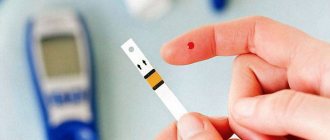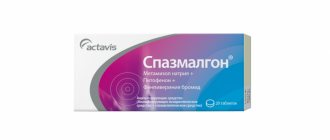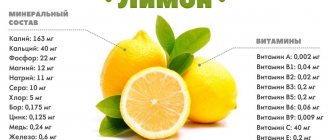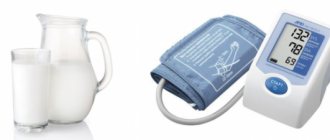Composition and beneficial properties
This cultivation is the result of a selective cross between orange and pomelo. The fruit is rich in vitamins, minerals and essential oils. Naringin, contained in the partitions of the fruit, imparts a specific bitterness.
Benefits include:
- improving the functioning of the digestive system;
- reduce blood cholesterol levels;
- Has a positive effect on depressive disorders and nervous exhaustion.
People just need to inhale the aromas of citrus fruits to improve their emotional state. To bring your nervous system back to normal, you can add fruit oil to your bath, and anxiety is often the cause of high blood pressure. Grapefruit helps achieve weight loss results, which is also a common trigger for high blood pressure. This product lowers blood sugar and is often recommended for diabetics.
Chemical composition
100 g of product contains 35 kcal. It has a positive effect on the digestive and vascular systems due to its high content of glycosides.
This consists of:
- beta-carotene;
- vitamins A, B, C, E, PP;
- minerals including iron, magnesium, potassium, phosphorus;
- essential oils;
- peptides.
The content of natural sugars and vitamin C in grapefruit is higher than in oranges. At the same time, the preservation time of the beneficial properties of the fruit is much longer.
Grapefruit and medications: an unpleasant surprise
Juices, especially freshly squeezed ones, have always been considered extremely healthy. Lots of vitamins, microelements - and everything is natural without any “chemicals”! But any plant, even grown in environmentally friendly conditions, is still a biochemical laboratory of nature, which is capable of presenting surprises.
Everyone knows that medications can interact with other foods they consume. But most often scientists are interested in the problem of compatibility of drugs and alcohol.
So, once a group of pharmaceutical scientists from the University of Western Ontario studied the question of how compatible blood pressure medications (calcium channel blockers) and alcohol are. To prevent psychological factors from influencing the results of the experiment, they decided to mask the taste of alcohol with white grapefruit juice. And unexpectedly it turned out that pure juice caused much more side effects and signs of overdose than alcohol.
What's so "bad" about grapefruit?
There's nothing wrong with it. Almost all substances that can affect the use of medications have a positive effect on the body, but together with medications they can play a cruel joke. Among these substances:
- Furanocoumarins.
They block the work of one of the most important enzymes, thanks to which a large number of drugs are metabolized. As a result, more medications enter the bloodstream than they should, and they have a toxic effect on the body. It takes 72 hours after eating grapefruit for this enzyme to function properly again. - Flavonoids.
They also block a number of enzymes that are responsible for processing drugs in different organs. Metabolism of drugs slows down. As a result, an increased concentration of drugs accumulates in the body. - There is still an unknown component that blocks the so-called P-glycoprotein, which is responsible for “cleansing” cells of unnecessary foreign substances: for example, it “throws” excess drugs out of the cell. If P-glycoprotein does not work well, then high concentrations of drugs accumulate in the cell, which can become toxic.
How much grapefruit is enough?
Surprisingly, not so much. If you take freshly squeezed juice, then to change the functioning of enzymes and disrupt the metabolism of drugs, it is enough to drink a little more than a glass.
It should be noted that the indicated dose is calculated approximately, because there are many additional factors on which the effect of the juice depends. Age, heredity, and also whether the person took some food with the juice or drank it on an empty stomach are important.
The type of medication also plays a big role. If, when treating with a specific drug, the exact dose is very important and deviation from it may negatively affect the patient’s condition, then grapefruit may cause more undesirable reactions.
What medications is grapefruit juice incompatible with?
Currently, 85 drugs are known. Among them:
- tranquilizers benzodiazepines (Phenazepam, Diazepam, etc.);
- antiepileptic drugs (Carbamazepine, Lamotrigine);
- statins - drugs that lower cholesterol (Lipitor, Mevacor, Zocor);
- antiarrhythmic (Cordarone);
- antimigraine (Ergotamine);
- drugs for erectile dysfunction (Viagra, Cialis);
- paracetamol;
- antiallergic (Fexofenidine);
- Omeprazole
and others.
Should I give up grapefruit?
There are undoubted grapefruit lovers for whom giving up their favorite fruit would be, although possible, very sad. Fortunately, pharmacologists believe that such sacrifices are not necessary. You should only eat these fruits or drink juice 4 hours before taking medications.
It is possible that grapefruit juice will not have such an adverse effect on you at all, but it is nevertheless best to be aware of this possibility.
Some fruits contain the same substances as grapefruits, but in lower concentrations. Among them are apples, oranges, pomelo. Therefore, pharmacologists warn that it is better not to take medications with juices at all.
Natalia Stilson
Photo thinkstockphotos.com
Products by topic: [product](Phenazepam), [product](Carbamazepine), [product](Lamotrigine), [product](Zocor), [product](Cordarone), [product](Ergotamine), [product]( paracetamol), [product](Omeprazole), [product](Cialis), [product](Viagra)
The effect of grapefruit on blood pressure
The positive effect of fruits on the body is due to the presence of a large number of useful substances. In this case, the fetus increases or decreases pressure, it depends on many circumstances. In traditional medicine recipes, this product is traditionally used as an ingredient that can be used to lower blood pressure. The ability of the drug to have a positive effect on the walls of blood vessels and reduce cholesterol levels can improve the well-being of a patient with hypotension.
Thanks to the special properties of grapefruit, the use of this product helps prevent heart pathologies and prevents the development of atherosclerosis. The ability to strengthen the body's defenses has a positive effect on the well-being of people who have problems with blood pressure.
Properties of grapefruit
The benefits of consuming this fruit have been known since ancient times. It is used:
- for disorders of the digestive tract;
- for disinfection of wounds;
- for the treatment of weak gums;
- in case of poisoning;
- to improve metabolism;
- for cleansing of toxins;
- as a stimulator of fat burning processes;
- to reduce bad cholesterol;
- to reduce glucose saturation.
Eating grapefruit helps increase the vitality of the body, improves appetite, and helps normalize liver function. This citrus replenishes spent energy and helps overcome fatigue.
A piece of this fruit before bed helps you forget about insomnia.
Important! Glycosides contained in grapefruit have an anti-sclerotic effect. They improve the strength and elasticity of blood vessels and arteries.
Patients who consume grapefruit for hypertension report improved health. The fruit reduces the risk of heart attack and stroke. Diabetics are also recommended to consume this citrus.
See also Normal human blood pressure by age
Use for high blood pressure
To combat and prevent hypertension, it is recommended to consume 1 grapefruit per day. A positive effect on the problem of arterial hypertension provides a decrease in cholesterol and glucose levels.
The high content of vitamin C helps to resist stress and fight nervous disorders, which are often precipitating factors of the disease.
The drug contains a large number of antioxidants that improve metabolic processes and strengthen blood vessel cells. This complex effect of the fruit on the body strengthens it and lowers blood pressure.
For the best blood pressure lowering effect, use red grapefruit varieties. People with hypertension require constant monitoring of blood pressure. If the result is positive and the pressure has stabilized and there are no sharp jumps in values, you can consult with your doctor on how to adjust your medication intake and reduce their dosage.
People with hypertension can consume not only the fruit, but also its juice to normalize blood pressure. The daily norm is 200 ml, which should be divided into several servings. For better taste, it is recommended to add a little honey to the juice.
What is hypertension and how does it appear?
First of all, hypertension is characterized by a persistent increase in blood pressure. At the same time, the numbers on the tonometer exceed the norm: above 140/90 mm Hg. Art. Then a diagnosis of “hypertension” is made and a certain type of treatment is prescribed.
What happens inside the human body? High blood pressure always indicates that arterial vessels lose their ability to expand and contract under certain conditions. Firstly, they become less elastic, and the vascular wall swells or swells, its thickness becomes much greater than it should be. As a result, it is very difficult for blood to “squeeze” through the vessel, and the heart has to work with more energy. In other words, the heart is forced to increase blood pressure in order to deliver blood to all our cells.
Use with low blood pressure
Many patients with low blood pressure try to avoid consuming this product, thereby depriving themselves of a valuable source of vitamins and minerals. Eating fruits indirectly affects blood pressure, that is, the product does not directly affect the indicators.
With low blood pressure, thanks to the beneficial properties of the fruit, it can strengthen the immune system to dissolve cholesterol platelets and strengthen blood vessels. Grapefruit can and should be used, but it pays to maintain reasonable standards.
Tablet compatibility
The inclusion of grapefruit in the menu should take into account its compatibility with several medications. Most often, these restrictions apply to drugs used in the treatment of heart and kidney disease. Grapefruit can enhance the work of such drugs, so there is a risk of overdose. Therefore, consuming grapefruit and taking medications should be separated over time.
When using oral contraceptives, it is worth knowing that fruit leads to a decrease in the active ingredients of active drugs. At the same time, frequent use of grapefruit in large quantities promotes the growth of estrogens, which are burdened with hormonal background disorder.
Is it possible to eat fruit if you have hypertension?
Grapefruit affects blood pressure through the main risk factors, which is characterized by a complex and safe effect on pathology. Therefore, citrus fruits are actively prescribed in the diet of hypertensive patients.
However, the active components of the fruit are not enough to treat the disease. The drug is not used for hypertensive crises or complicated types of hypertension. The effectiveness of grapefruit is based on a combination with traditional pharmacological methods of blood pressure correction.
If objective symptoms appear (pain in the back of the head, dizziness, rapid heartbeat), it is necessary to consult a doctor and prescribe drug therapy.
Reception features
It is necessary to use grapefruit for blood pressure after consulting a specialist to exclude contraindications and compatibility with concomitant therapy.
Rules for safe and effective consumption of fruit:
- For the purpose of treating or preventing cardiovascular diseases, it is recommended to consume 1 fruit daily.
- You can replace the fruit with 1 glass of freshly squeezed juice with pulp (“fresh”). To reduce bitterness, it is recommended to add 1 tablespoon of honey.
- Patients with sensitive tooth enamel need to drink juice through a straw.
- The fruit is consumed after meals, since the extractive substances of the fruit cause irritation of the mucous membrane.
- Patients with reduced secretory function (hypoacid gastritis) are recommended to drink juice on an empty stomach.
- Grapefruit should be prescribed with caution to pregnant women, nursing mothers and children due to the risk of allergic reactions. Start with small portions of the fruit (1 slice), gradually increasing the dose.
- If signs of hypersensitivity appear, you should stop taking the fruit.
The combination of grapefruit, medications and herbal medicines that lower blood pressure enhances the effectiveness of therapy.
Contraindications
Despite the fact that the health benefits of grapefruit are undeniable, citrus fruits will have to be excluded from the menu if there are contraindications:
- individual intolerance;
- hypervitaminosis;
- problems with intestinal patency, frequent constipation;
- increased acidity of gastric juice, chronic gastritis, stomach or duodenal ulcer;
- chronic fatigue syndrome;
- severely damaged or very sensitive tooth enamel, stomatitis, other diseases affecting the oral mucosa;
- Raynaud's syndrome and some other vascular pathologies;
- any liver problems.
Important! There is evidence to suggest that women who abuse grapefruits after menopause have a markedly increased risk of developing malignant tumors, especially breast cancer.
You can minimize the possible harm of grapefruit juice to the oral cavity if you drink it through a straw.











